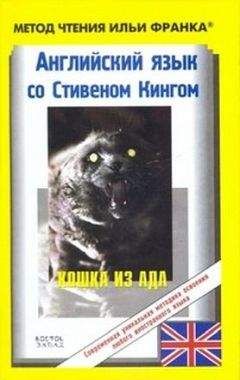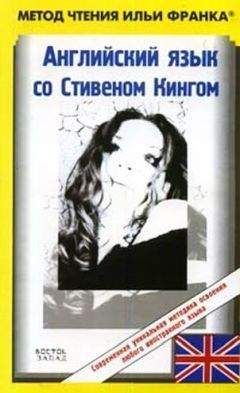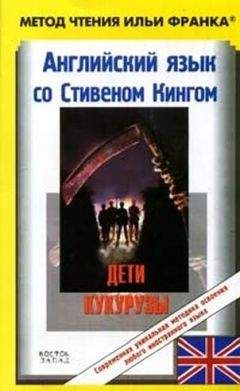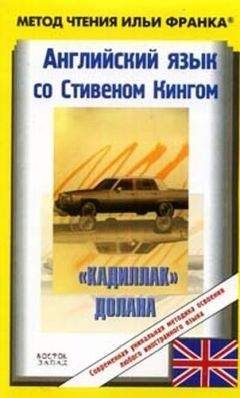Stephen King - Английский язык с С. Кингом "Верхом на пуле"
scholarship ['skOlqSIp], pleasure ['pleZq], reverse [rI'vWs]
Her working all those jobs and taking the overtime and taping her ankles when they swelled and putting her tips away in a jar marked alan's college fund just like one of those dopey rags-to-riches stories, yeah, yeah and telling me again and again that I had to work hard, other kids could maybe afford to play Freddy Fuckaround at school but I couldn't because she could put away her tips until doomsday cracked and there still wouldn't be enough; in the end it was going to come down to scholarships and loans if I was going to go to college and I had to go to college because it was the only way out for me... and for her. So I had worked hard, you want to believe I did, because I wasn't blind — I saw how heavy she was, I saw how much she smoked (it was her only private pleasure... her only vice, if you're one of those who must take that view), and I knew that some day our positions would reverse and I'd be the one taking care of her.
With a college education and a good job, maybe I could do that (с университетским образованием и хорошей работой я, пожалуй, мог бы это делать). I wanted to do that (я хотел это делать). I loved her (я любил ее). She had a fierce temper and an ugly mouth on her (у нее был тяжелый/вспыльчивый характер и она часто бранилась: «/у нее был/ уродливый/скверный рот»; fierce — жестокий, лютый; неистовый; горячий, пылкий) — that day we waited for the Bullet and then I chickened out (в тот день, когда мы ждали очереди на “Пулю” и когда я струсил) wasn't the only time she ever yelled at me and then swatted me (/это/ был не единственный раз, когда она кричала на меня, и потом давала тумака) — but I loved her in spite of it (но я любил ее несмотря на это). Partly even because of it (частично даже из-за этого). I loved her when she hit me as much as when she kissed me (я любил ее, когда она била меня, так же сильно, как когда она целовала меня). Do you understand that (вы понимаете это)? Me either (я тоже /не понимаю/; either — также, тоже /в отрицательных предложениях/). And that's all right (и это нормально). I don't think you can sum up lives or explain families (я не думаю, что можно обобщать жизни и объяснять семьи = отношения в семье;to sum up — суммировать; обобщать), and we were a family, she and I (а мы были семьей, она и я), the smallest family there is (самой маленькой семьей, какая только может быть), a tight little family of two, a shared secret (тесной, маленькой семьей из двоих, нашей тайной; to share — делить; разделять /что-либо с кем-либо/; shared — общий, разделяемый). If you had asked, I would have said I'd do anything for her (если бы меня спросили, я бы ответил, что сделал бы все для нее). And now that was exactly what I was being asked to do (и сейчас это именно то, что меня просили сделать). I was being asked to die for her (меня просили умереть ради нее), to die in her place (умереть вместо нее: «на ее месте»), even though she had lived half her life, probably a lot more (даже несмотря на то, что она прожила половину своей жизни, возможно намного больше). I had hardly begun mine (я едва начал свою /жизнь/).
education ["edju(:)'keIS(q)n], fierce [fIqs], yell [jel]
With a college education and a good job, maybe I could do that. I wanted to do that. I loved her. She had a fierce temper and an ugly mouth on her — that day we waited for the Bullet and then I chickened out wasn't the only time she ever yelled at me and then swatted me — but I loved her in spite of it. Partly even because of it. I loved her when she hit me as much as when she kissed me. Do you understand that? Me either. And that's all right. I don't think you can sum up lives or explain families, and we were a family, she and I, the smallest family there is, a tight little family of two, a shared secret. If you had asked, I would have said I'd do anything for her. And now that was exactly what I was being asked to do. I was being asked to die for her, to die in her place, even though she had lived half her life, probably a lot more. I had hardly begun mine.
“What say, Al (что скажешь, Эл)?” George Staub asked. “Time's wasting (время уходит: «теряется»).”
“I can't decide something like that (я не могу решать такое = сделать такой выбор),” I said hoarsely (хрипло). The moon sailed above the road (луна плыла над дорогой), swift and brilliant (быстрая и сияющая). It's not fair to ask me (несправедливо спрашивать меня; fair — привлекательный; честный; справедливый).”
“I know, and believe me, that's what they all say (я знаю, и поверь мне, все так говорят: «это то, что говорят все»).” Then he lowered his voice (затем он понизил голос). “But I gotta tell you something (но я должен кое-что тебе сказать; gotta = /have/ got to) if you don't decide by the time we get back to the first house lights (если ты не решишь к тому времени, как мы доберемся до огней первого дома), I'll have to take you both (я должен буду забрать вас обоих).” He frowned, then brightened again (он нахмурился, потом снова повеселел/его лицо прояснилось), as if remembering there was good news as well as bad (как будто вспомнил, что есть и хорошие новости, а не только плохие). “You could ride together in the backseat if I took you both (вы можете ехать вместе на заднем сидении, если я заберу вас обоих), talk over old times, there's that (говорить о старых временах, вот что).”
“Ride to where (ехать куда)?”
lower ['lquq], frown [fraun], brighten ['braItn]
“What say, Al?” George Staub asked. “Time's wasting.”
“I can't decide something like that, I said hoarsely. The moon sailed above the road, swift and brilliant. It's not fair to ask me.”
“I know, and believe me, that's what they all say.” Then he lowered his voice. “But I gotta tell you something if you don't decide by the time we get back to the first house lights, I'll have to take you both.” He frowned, then brightened again, as if remembering there was good news as well as bad. “You could ride together in the backseat if I took you both, talk over old times, there's that.”
“Ride to where?”
He didn't reply (он не ответил). Perhaps he didn't know (возможно, он не знал). The trees blurred by like black ink (деревья проносились мимо, сливались в сплошное темное пятно, как черные чернила; blur — пятно; клякса; to blur — пачкать/ся/; смазывать; делать/ся/ неясным; by — мимо). The headlights rushed and the road rolled (передние фары мчались = свет фар мчался /вперед/, и дорога исчезала под колесами: «катилась/вращалась»). I was twenty-one (мне был двадцать один /год/). I wasn't a virgin but I'd only been with a girl once (я не был девственником, но я был с девушкой только однажды) and I'd been drunk and couldn't remember much of what it had been like (но я был пьян и не мог хорошо вспомнить, на что это было похоже). There were a thousand places I wanted to go (была тысяча мест, куда я хотел бы поехать) — Los Angeles (Лос-Анджелес), Tahiti (Таити), maybe Luchenbach, Texas (может быть, Люхенбах, /штат/ Техас) — and a thousand things I wanted to do (и тысячи вещей, которые я хотел бы сделать). My mother was forty-eight and that was old, goddammit (моей матери было сорок восемь, она была старой, черт возьми). Mrs. McCurdy wouldn't say so but Mrs. McCurdy was old herself (миссис МакКурди так не сказала бы, но она сама была старой). My mother had done right by me (моя мама делала все для меня; to do right by smb. — поступать, обращаться с кем-либо правильно, хорошо, справедливо), worked all those long hours and taken care of me (работала все эти долгие часы и заботилась обо мне), but had I chosen her life for her (но я ли выбрал жизнь для нее)? Asked to be born and then demanded that she live for me (просил, чтобы меня родили: «быть рожденным», а потом требовал, чтобы она жила ради меня; to bear — носить, нести; рождать, производить на свет)? She was forty-eight. I was twenty-one. I had, as they said, my whole life before me (у меня была, как говорится, вся жизнь впереди: «передо мной»). But was that the way you judged (но так ли бы вы судили)? How did you decide a thing like this (как бы вы решили такой вопрос)? How could you decide a thing like this (как можно решить такой вопрос)?
perhaps [pq'hxps], [prxps], virgin ['vWGIn], born [bLn]
He didn't reply. Perhaps he didn't know. The trees blurred by like black ink. The headlights rushed and the road rolled. I was twenty-one. I wasn't a virgin but I'd only been with a girl once and I'd been drunk and couldn't remember much of what it had been like. There were a thousand places I wanted to go — Los Angeles, Tahiti, maybe Luchenbach, Texas — and a thousand things I wanted to do. My mother was forty-eight and that was old, goddammit. Mrs. McCurdy wouldn't say so but Mrs. McCurdy was old herself. My mother had done right by me, worked all those long hours and taken care of me, but had I chosen her life for her? Asked to be born and then demanded that she live for me? She was forty-eight. I was twenty-one. I had, as they said, my whole life before me. But was that the way you judged? How did you decide a thing like this? How could you decide a thing like this?




